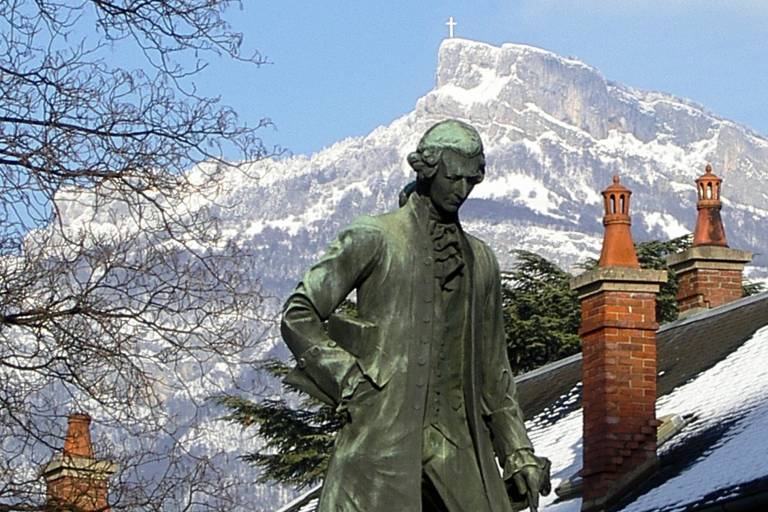Jean-Jacques Rousseau statue


Description
Statue de Jean-Jacques Rousseau, sculpted by Mars Valett in 1910.
‘It’s a shame that the Savoyards are not wealthy, or maybe it would be a shame if they were… for whatever they are, they are the best and most friendly people that I know. If there is a small town in the world where you can taste the sweetness of life in agreeable company, it’s surely Chambéry’. (Les Confessions, Book V).
In 1728, at the age of 16, Rousseau decided to leave his home town of Geneva, and after a few days of wandering, he arrived in the Savoie. The priest of Confignon welcomed him and sent him to a ‘charitable good woman’ in Annecy. Madame de Warens received the young Jean-Jacques in her home, and despite her being 12 years his senior, Rousseau soon fell under her spell. Françoise-Louise de Warens was born in Vevey, in the Vaud region. Abandoned by her husband, she decided to convert to Catholicism, as, in the Savoie, it had a significant amount of wealth, during a period of intense power struggle against the Reform. The King of Sardinia, Victor-Amédée II, provided Madame de Warens with an annual pension to welcome Swiss Calvinists who had fled to the Savoie to join the Catholic church.
Rousseau renounced Calvinism and was baptised in Turin within a few days, before returning to Madame de Warens’ house in Annecy. A few months later, at the beginning of autumn 1731, he found her again in Chambéry, where she had recently moved. ‘The house that she lives in is sombre and sad, and my room is the most sombre and saddest of them all. A view of a wall, a cul-de-sac for a road, no air, no space, crickets, rats, rotten boards – hardly conducive to pleasant lodgings. But I was with her, close to her…’
Madame de Warens found Rousseau (her future lover) a job at the ‘mensuration Générale de Savoie’, that is to say in the Sardinian land registry, in the Château. The adventurous spirit of the young man quickly tired of the routine and monotony of such a job, so he would find excuses to read and learn arithmetic, geometry and design. For the time being, he was uninterested in botany.
However, since he was a child, music completely absorbed him - this passion would last his whole life. He would organise small concerts, with the help of artists and amateurs, and offered his services as a professor of music theory and singing for well-heeled young ladies, despite the misgivings of his protector. From 1735 or 1736, Madame de Warens and Jean-Jacques would spend the summer in the Charmettes estate.
Pricing
Additional information
Languages spoken
Facilities
Pet
Pet allowed
Pet not allowed
